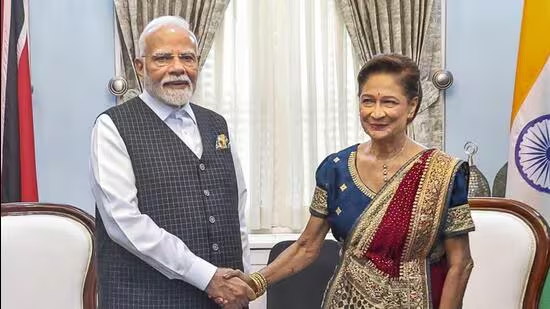India and Trinidad & Tobago Deepen Strategic Partnership with Six Landmark Agreements
- MGMMTeam

- Jul 6, 2025
- 4 min read
In a momentous step towards strengthening bilateral relations, India and Trinidad & Tobago signed six Memorandums of Understanding (MoUs) aimed at broadening cooperation across key sectors such as infrastructure, healthcare, culture, and diplomacy. The pacts were formalized during Prime Minister Narendra Modi’s historic visit to the Caribbean nation—marking the first by an Indian prime minister in over two decades.

Reviving Diplomatic Momentum
Prime Minister Modi’s visit symbolizes a renewed era of engagement between India and Trinidad & Tobago. Held against the backdrop of India’s growing role in the Global South, the summit witnessed wide-ranging discussions between PM Modi and his counterpart, Prime Minister Kamla Persad-Bissessar, on avenues to boost economic, technological, and cultural partnerships. The visit was part of Modiji's five-nation diplomatic tour that also includes Ghana, Argentina, Brazil, and Namibia.
During the talks, both leaders emphasized their commitment to shared democratic values, deep historical ties, and common interests in global affairs. They reiterated their resolve to collaborate more closely in multilateral platforms such as the United Nations and CARICOM.
Expanding the Scope of Cooperation
The six MoUs signed between the two nations cover a diverse range of sectors. One of the most notable agreements involves collaboration in the pharmaceutical field, particularly aligning with India’s stronghold in affordable and quality generics. Infrastructure development was another focal point, with both countries agreeing to facilitate knowledge sharing and explore investment opportunities in critical projects.
Another MoU introduced India’s “Quick Impact Projects” framework to Trinidad & Tobago, allowing for the swift implementation of community-level initiatives in healthcare, agriculture, and rural development. These projects are designed to bring visible changes to people’s lives in a short timeframe, leveraging India’s development experience.
The cultural dimension of the partnership also saw significant enhancement. Agreements were made to revive academic collaborations such as re-establishing Chairs of Hindi and Indian Studies at the University of the West Indies. Furthermore, a cultural exchange program was announced to span 2025 to 2028, alongside increased cooperation in sports—especially in developing infrastructure and promoting women's cricket.
On the technological front, India offered its advanced digital public infrastructure systems like the Unified Payments Interface (UPI), DigiLocker, and Aadhaar for possible adoption or adaptation in Trinidad & Tobago’s governance and financial systems.
Strengthening People-to-People Bonds
Recognizing the strong Indian diaspora presence in Trinidad & Tobago—accounting for nearly 45% of the country’s population—Prime Minister Modi announced an expansion of the Overseas Citizenship of India (OCI) eligibility to the sixth generation of Indian origin. This move was warmly welcomed by the Indian-Trinidadian community and underscores India's commitment to nurturing diaspora relationships not just in rhetoric but through policy.
In his address to the Parliament of Trinidad & Tobago, PM Modi struck a chord by referring to PM Kamla Persad-Bissessar as “Bihar ki Beti” (daughter of Bihar), highlighting her ancestral roots. He emphasized the cultural and emotional ties that bind the two nations, from Bhojpuri traditions to a shared love for cricket. “Indians are among the most passionate fans of the West Indies cricket team—except when they’re playing against India,” Modiji remarked to a round of applause.
Mutual Support in Global Governance
The two leaders also affirmed their shared vision for reforming global governance structures. Trinidad & Tobago reiterated its support for India’s bid for a permanent seat on the United Nations Security Council. In return, India extended its backing for Trinidad & Tobago’s candidacy for a non-permanent seat during the 2027–2028 term.
The discussions also covered broader global concerns, including climate change, disaster resilience, cyber security, and counter-terrorism. PM Modi thanked the Trinidadian leadership for expressing solidarity after the recent Pahalgam terror attack in Jammu & Kashmir, reinforcing the importance of unity in confronting global threats.
A Visit Rich in Symbolism and Substance
In recognition of his contributions to global diplomacy and India’s growing engagement with the Caribbean, Prime Minister Modi was honored with the Order of the Republic of Trinidad & Tobago, the country’s highest civilian award. He later met with President Christine Carla Kangaloo and expressed appreciation for the Indian diaspora’s role in shaping the social and economic fabric of the Caribbean nation.
Beyond the ceremonial aspects, the visit succeeded in laying a strong foundation for future collaboration. It emphasized that India’s outreach is not limited to geopolitical heavyweights but extends to all nations with whom it shares historical, cultural, and human bonds.
Conclusion: A Renewed Partnership with Shared Aspirations
The visit by Prime Minister Modi and the signing of six MoUs mark a new chapter in India–Trinidad & Tobago relations. From economic and digital collaboration to cultural exchange and diplomatic support, the multifaceted agreements signal a strategic deepening of ties that transcend traditional diplomacy.
At a time when global geopolitics is shifting and the voice of the Global South is gaining prominence, this partnership stands as a testament to the importance of unity, heritage, and mutual respect. As both nations look forward to implementing the signed agreements, the visit may well serve as a model for India’s engagement with other small but significant partners across the world.
(Sources: Money Control, Hindustan Times, The Hindu)




Comments